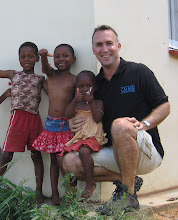Virtually everyone I encounter at the hospital thinks that I am a doctor when they first meet me -- even many of the other doctors and hospital employees. I suppose I fit the part -- a tall white man, greying at the temples, and hanging out at a hospital. Both patients and people coming in for the first time regularly come up to me saying "Dokotela?" Dokotela is the word for doctor in SiSwati. Quite a few people, even those I have no recollection of ever seeing before, know my name and call me "Dokotela David." (The word for nurse is "nesse." I love the way the Swazis have appropriated English words and made them their own.)
Sometimes, if it seems pointless to do otherwise due to the language barrier or if I'm too busy to stop and go into long explanation, I don't correct the misapprehension, and I just try to help them anyway. This morning, as I stood outside of the Home-Based Care office, where Scott works and which is my unoffical base at the hospital, a young high-school aged girl approached me as "Dokotela Dave." She spoke good English, and told me that she was experiencing some sort of problem with her eye-sight, and it was giving her severe headaches. Since I've been having recurring headaches myself as a result of my tick-bite fever, I felt her pain and didn't want to ignore her complaint. She'd been waiting in the OPD (out-patient department) which is just upstairs from Home-Based Care office, and they'd referred her to the hospital's eye clinic. They'd also told her to buy some over-the-counter pain medication, but she didn't know what to buy and had no money anyway. I told her to buy some Paracitemol (local version of Tylenol) and gave her 20 Emalengani (about $2). She went away happy, and I felt that the interaction had gone smoothly despite the fact that I'm not really a doctor. Unfortunately, I hadn't considered the long line of patients standing nearby waiting to be seen in the OPD. As soon as the young girl walked away, a man and woman came over and told me that the woman had a terrible tooth-ache, she hadn't slept for days, and needed treatment ASAP. I was able to refer them to the hospital's dental clinic, and they too went away satisified. Next a woman with a sick child approached me holding out her child's medical papers. (Everyone here carries their medical records with them in much the same way we carry driver's licenses -- you never know when you'll need to have them on hand.) I've grown familiar with reading them during the home visits I sometimes make with Scott. I briefly looked at the child's medical records, and then gave the mother directions to the pediatric ward. As soon as they left I was surrounded by a sea of others who had witnessed my authoritative handling of the three previous patients. At first I just laughed to myself about the situation I'd gotten myself into, but these people were serious -- they wanted help now. I took the next patient's papers and looked at them briefly and then told him to go upstairs to OPD. The next in line was a mother with four young children in tow. It so happens the woman was a dwarf and was the same height as her children -- maybe three and half feet tall. She spoke excellent English and launched into a long list of each child's complaints. "This one has white spots all over his body. This one has a terrible cough. This one has nausea...." I finally cut her off and explained I was not a doctor. She looked at me incredulously; I don't think she believed me at first. She asked me again, "Can't you help my children, Dokotela?" I smiled at her and repeated that I wasn't a doctor, but an administrator. She smiled for a moment and then launched into a stream of SiSwati, which made everyone in line start laughing -- some of them uproariously. One old man started pounding his walking stick on the ground he thought it was so funny. I didn't understand a word the woman had said, but I caught the gist of it anyway: tall white know-it-all being told off by African dwarf. I laughed too -- partly out of nerves, but mostly sincerely -- it was all I could do in the situation. My nerves were totally unwarranted, everyone remained friendly, and I'm glad that my cluelessness gave them a laugh. Despite the fact that I'm not a medical professional, I've found ways to be helpful both at the hospital and elsewhere in the community, but perhaps this is an important new one: to entertain the people waiting in the endless line for the OPD. They could certainly use a laugh.
Friday, February 20, 2009
Subscribe to:
Post Comments (Atom)

3 comments:
Doctor David, I presume? I think you did a fine job triaging. Hope your headaches get better soon.
Maybe thats something the hospital could use a person who can triage sending people where they need to be rather than waiting in the wrong place. You have to Love those dwarfs. Enjoyed your blog and experience. I can't think of anything more exhausting and difficult than helplessness in the face of overwhelming need. Hospice its an exercise at one helpless situation at a time. Where you are it is a sea of it pounding your shore.
Thanks for the update. Tell that other blogger we are getting inpatient. SB
Post a Comment